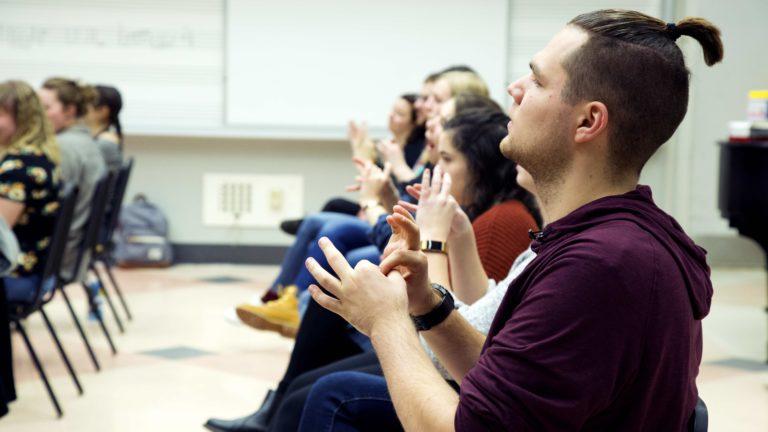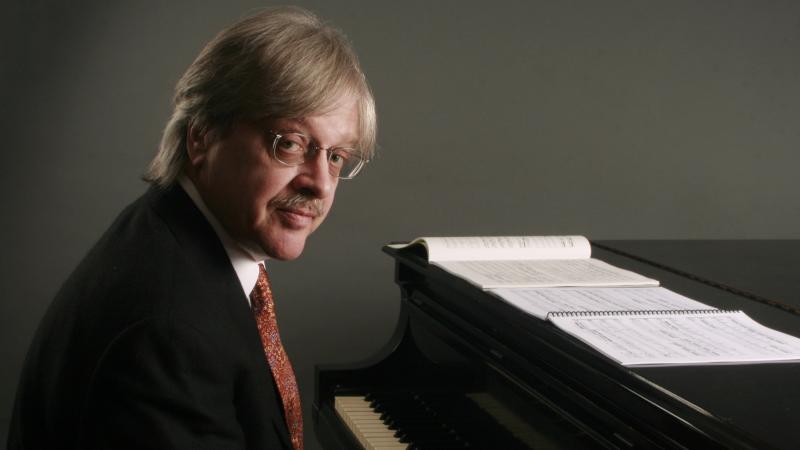Linda Morgan-Clement and Copeland Woodruff see an opportunity for conversation.
About faith. About no faith. About shared experiences and differing ideologies. About inclusion. About the barriers that keep us from talking freely about our own cluttered spiritual journeys.
With Lawrence University Opera Theatre presenting in mid-February a much-anticipated retelling of Leonard Bernstein’s Mass, featuring a Deaf character and the use of sign language, there is a window in which to engage people in conversation about how we communicate — or better yet, don’t communicate — on those often uncomfortable topics.
“The Mass is this touchpoint for us,” said Morgan-Clement, the Julie Esch Hurvis Dean of Spiritual and Religious Life at Lawrence.
Morgan-Clement’s office is collaborating with Woodruff, the award-winning Director of Opera Studies and Associate Professor of Music at Lawrence, to bring together public conversations about Mass, a production that was both acclaimed and controversial when it debuted in 1971 and is being presented now as part of the world-wide celebration of Bernstein’s 100th birthday.
Mass will be staged Feb. 14-17 at Lawrence University’s Stansbury Theater.
Congregants from Memorial Presbyterian Church, First English Lutheran Church, First Congregational United Church of Christ and the Fox Valley Unitarian Universalist Fellowship will take part in the public conversations.
The first session is a talk led by Morgan-Clement from 5:30 to 6:45 p.m. Wednesday, February 6 at First Congregational UCC, 724 E. South River St., Appleton. Participants will then be able to sign up to attend a dress rehearsal of Mass at Stansbury Theater and will have the opportunity to purchase reduced-price tickets to one of the performances. They also will be able to participate in a post-performance talk back with cast members.

Linda Morgan-Clement
The opera, with its use of a Deaf character and the incorporating of American Sign Language (ASL) and Pidgen Signed English (PSE), provides an interesting opportunity to talk about how we communicate and the barriers we often put up, Morgan-Clement said.
“Part of what (Woodruff) is doing is trying to bring it into the contemporary world, so he will be using a Deaf actor for kind of a metaphor for thinking about how we communicate,” she said.
The arts — and in this case, Bernstein’s Mass — can be used to engage people in conversations they might not otherwise have.
“It gives people a touchpoint around which to come together,” Morgan-Clement said. “It’s not just let’s get together and talk about the ways we don’t talk.”
There is so much to unpack with this production that the conversations come naturally.
“It’s the Mass, which was so controversial in its own time,” Morgan-Clement said.
The modern music, the discord, the journey of doubt playing out on stage, all crashing into the deep traditions of a Catholic mass. It provides an avenue for discussion of our differences and our similarities.
“So it opens up this moment in today’s time for people to talk about the ways in which we … are still being human together, sharing this earth, a lot of commonality in our emotional framework and the ways we operate,” Morgan-Clement said. “And in what ways do the symbols and the language get in our way of actually hearing each other?”
Important dialogue
Woodruff often looks for community partnerships as he uses opera to explore a range of socially relevant issues. With Mass, the incorporation of a Deaf character provides an opportunity for engagement with the Deaf and hard-of-hearing communities, discussion of language and culture issues in those communities and a wider dialogue surrounding communication barriers that often hamper conversations on spiritual topics.
In addition to the collaboration with the Office of Spiritual and Religious Life, Lawrence students are taking part in community engagement activities, including a performance of selections from the opera at Appleton’s Edison Elementary School, which serves both Deaf and Hard-of-Hearing students.
Members of the production team say the opera could reach as many as 2,000 people in the Fox Valley.
“It is rare — even at the national level — for a signed opera to be produced and performed,” Woodruff said. “The majority of our area’s theater-going public would not ordinarily experience this type of performance. Mass will open dialogues about faith and inclusion to our community.”
Woodruff and the Lawrence University Opera Theatre Ensemble are partnering with members of two local children’s choirs to reimagine Mass, which is structured like a Roman Catholic Tridentine Mass but mixes sacred and secular texts and music. The Celebrant leads the ceremony, and the Deaf character is the voice of the congregation challenging the Celebrant. They argue and search for answers to universal questions together — their diversity highlighted by an eclectic blend of blues, rock, gospel, folk, Broadway, jazz, hymnal, Middle Eastern dance and orchestral music.
Through the production, the characters seek a new path to shared communication, exploring how we can hear each other despite our differences.
Ultimately, they affirm the value of faith and a desire for peace.
That’s the path Morgan-Clement is looking to explore in the session that kicks off the conversation on Feb. 6.
“It just makes sense for us to see whether there are things we can or would like to do together,” she said of the collaboration with the Opera Theatre team.
Incorporating sign language
The production of Mass features a professional Deaf actor, Robert Schleifer, as well as a local interpreter for the Deaf, Kristine Orkin. Schleifer, along with Lawrence student performers, will sign most of the opera’s lyrics in real time during the performance. Lawrence students have been getting training in using ASL. Deaf audience members also will be able to read supertitles.
For Schleifer, the blending of opera with ASL is powerful and moving.
“My love of opera is longstanding, its visual language fascinating — depicted through conductor wand gyrations, the energetic dance of bodies fused with instruments in orchestral rhythms, singers’ storytelling through facial expression and movement and breathing strength — the power I see touches my soul,” he said.
“Bernstein’s Mass project has been both a challenging and awesome experience, from the sound of the music itself and the abstract concepts portrayed through tone and inflection, which I cannot hear, relying on facial and body cues, figuring how to match American Sign Language with operatic language, to the awesome collaboration with Copeland and Kris, who helped me understand the complexities of poetic language, appreciate the culture of opera, and together watch the beautiful magic unfold.”
Bernstein’s Mass debuted in 1971 after the famed composer was asked by Jacqueline Kennedy Onassis to compose a piece for the 1971 inauguration of the Kennedy Center for the Performing Arts in Washington, D.C.
Opera has been an integral part of the Lawrence voice program for almost 60 years, a centerpiece of the performance opportunities for voice students. Under Woodruff’s direction, Lawrence’s mainstage operas have received national awards, including Hydrogen Jukebox (2017) and The Beggar’s Opera (2016), which shared first prize for the American Prize in Opera Performance in the college/university division. Le comte Ory (2018) and The Beggar’s Opera also received first place from the National Opera Association; Hydrogen Jukebox received third place in the same competition. Woodruff was also named the 2018 recipient of the American Prize’s Charles Nelson Reilly Prize for stage direction.
Lawrence’s production of Mass is supported by grants from 91.1 The Avenue and the Jewelers Mutual Charitable Giving Fund and the Bright Idea Fund within the Community Foundation for the Fox Valley Region. The Office of Spiritual and Religious Life is able to co-sponsor the production and public conversation through the Hurvis endowment.
Mass: A Theatre Piece for Singers, Players, and Dancers will be performed February 14-17, 2019, in Stansbury Theatre on the Lawrence University campus. More information, including ticket information, can be found at go.lawrence.edu/massopera.
Note: This story has been updated to reflect the date change for the public conversation on faith and communication. Due to the extreme cold weather, it was moved from 5:30 p.m. Jan. 30 to 5:30 p.m. Feb. 6. All other details remain the same.




